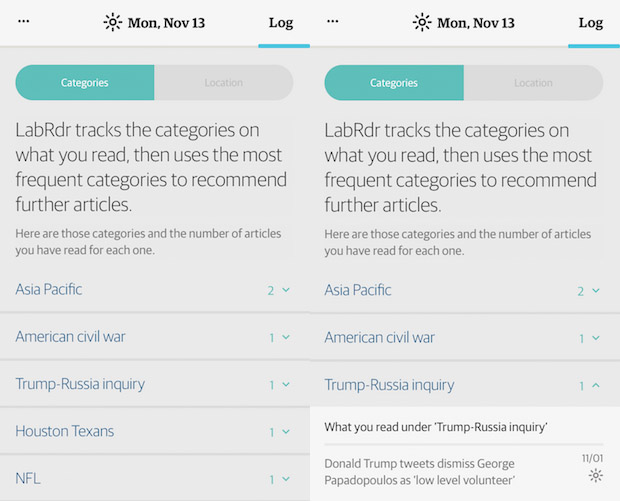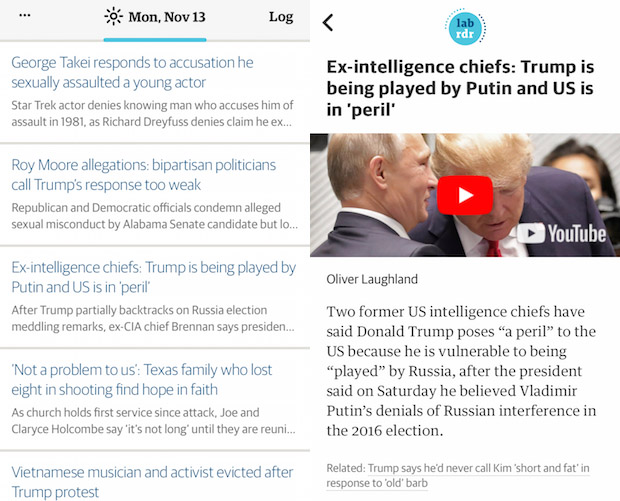The Guardian Mobile Innovation Lab has developed an experimental iOS app aimed at improving the offline news reading experience for people who commute using public transport.
The app, called LabRdr (pronounced 'lab reader'), was released last month, and provides users with a package of Guardian articles twice a day, in time for their morning and evening commute.
The package is tailored to the duration of their travel, and personalised based on people's interests, with the view of taking into account other signals in the future, such as their location or what other people are reading nearby.
The idea to improve offline reading through content recommendations that take into account signals already stored on someone's mobile device came from an issue one of the lab's engineers, Connor Jennings, was facing regularly on his commute. He would open some articles at random on his phone before entering the subway station, in order to have something to read while he travelled, but these weren't necessarily tailored to his interests.
The team looked at how existing apps approach offline reading, and found some limitations, Sasha Koren, editor of the Lab, told Journalism.co.uk. Users would either receive all the news content in an "unmediated stream", regardless of whether they wanted to read about something in particular during their commute, while in the case of apps such as Flipboard, there is "a lot of input needed at the outset to get them to work for you" even if they are geared towards someone's interests.
"Topics of interest [as a mobile signal] has been explored by news organisations for a while," added Sarah Schmalbach, senior product manager at the Lab. "We are interested in the combination of using topic-based recommendations paired with transparency around those recommendations, that's the kind of newness that LabRdr has to offer."
When a user downloads the app, they are asked to log in with their Gmail account, after which they can adjust the length and time of their morning and evening commute, so LabRdr can tailor their news package accordingly and make it available at the right time. They can also opt in to receive experimental notifications.

Initially, the stories they receive as part of their package are drawn from various sections across the Guardian US website, but after a few sessions, the app uses the tags associated to the articles someone clicks on to calculate a relevancy score and start prioritising what they see in the stream.
Users can see what they have been clicking on as well, by visiting the 'log' section of the app, which displays all the categories they read and that LabRdr is tracking, for example 'Trump-Russia inquiry', 'Silicon Valley' or 'Democrats', the number of articles accessed in each category, and the headlines of each of these stories.
The log also features a 'location' tab, which tells users the app tracks their device location "in order to experiment with ways to deliver you a better news reading experience". It includes a map of hotspots, showing people the places they commute from and to more often.
The thinking behind the log and the map was to "experiment with another layer of transparency", Koren said, and make it clear to people how their data is being used and how it shapes the services they are being offered.

"There are more opportunities to say 'here is what we know' and 'here's what we're doing and not doing with it', to sort of break apart a little bit that black box of data that each company and each organisation has on us.
"They're not necessarily always making clear they are using it when they give us services, even if they are usable services based on location, there is something in the transparent use of data that will inspire loyalty I hope, so we are trying to see where that takes us.
"Being able to understand the correlation between your commute patterns, your reading patterns and the eventual recommendations feels like a loop that needs to be closed," Schmalbach added.
A week into the experiment, a "couple hundred people" from various countries had downloaded LabRdr and enabled the alert and location permissions, and the team observed some patterns in how the app was being used.
For example, people would go into the app over the weekend, when the content wasn't being repopulated and no alerts were sent, and many of them were also accessing LabRdr directly, as opposed to opening it when they received the notification saying their package is ready.
Other than the standard notification, the team has been experimenting with another push alert that triggers when someone starts moving before their stated commute time, for example if they are going to the gym, asking the user if they would like to access their stories then.
The app is a temporary product and it will be available for the next few months, so that the team can build on the use of the location signal and test other ideas, such as customising the packages to a person's average reading time.
"These are all just pathways we are trying to build for other news organisations to understand the types of things they can be thinking about if they are trying to optimise content delivery on an individual user basis almost, and what opportunities mobile offers them," Schmalbach said.
Free daily newsletter
If you like our news and feature articles, you can sign up to receive our free daily (Mon-Fri) email newsletter (mobile friendly).










